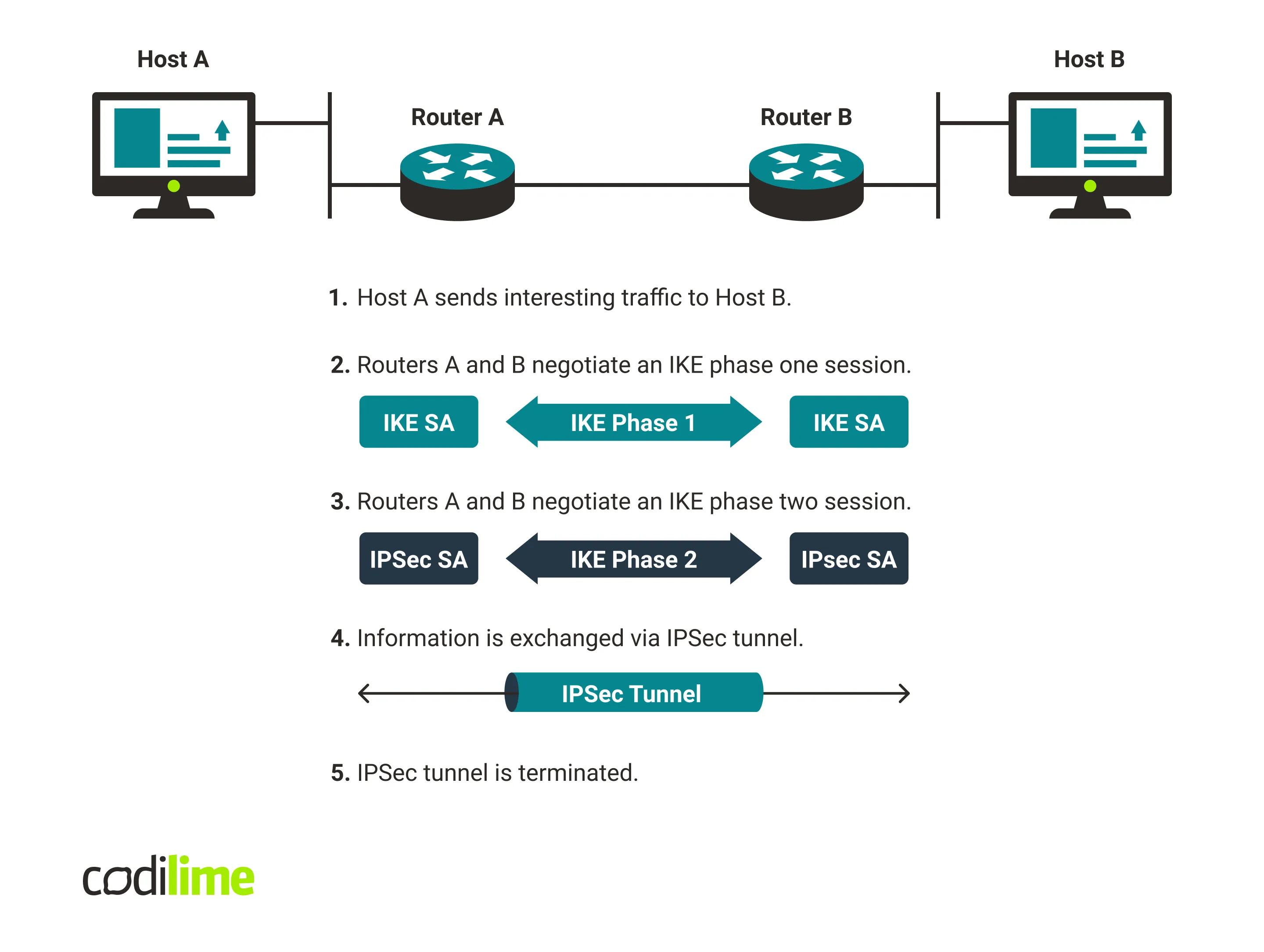Featured
Table of Contents
What Is Ipsec Vpn And How Does It Work? The Complete ...
These settlements take two forms, primary and aggressive. The host system that starts the process suggests encryption and authentication algorithms and negotiations continue till both systems settle on the accepted procedures. The host system that begins the process proposes its favored encryption and authentication techniques however does not work out or alter its choices.
When the information has been transferred or the session times out, the IPsec connection is closed. The private secrets used for the transfer are deleted, and the process comes to an end.
IPsec utilizes two primary procedures to provide security services, the Authentication Header (AH) procedure and the Encapsulating Security Payload (ESP) protocol, along with numerous others. Not all of these protocols and algorithms have actually to be used the specific choice is figured out during the Settlements phase. The Authentication Header protocol validates data origin and stability and supplies replay protection.
Ipsec Overview
The Kerberos protocol supplies a central authentication service, permitting devices that utilize it to confirm each other. Various IPsec executions might use various authentication techniques, but the result is the same: the safe and secure transference of data.
The transportation and tunnel IPsec modes have several essential distinctions. File encryption is only applied to the payload of the IP package, with the original IP header left in plain text. Transportation mode is generally used to offer end-to-end interaction between 2 gadgets. Transportation mode is mainly utilized in circumstances where the 2 host systems interacting are trusted and have their own security procedures in place.
File encryption is used to both the payload and the IP header, and a new IP header is added to the encrypted package. Tunnel mode provides a secure connection between points, with the initial IP package covered inside a brand-new IP package for additional security. Tunnel mode can be used in cases where endpoints are not trusted or are lacking security mechanisms.
What Is Ipsec?
This suggests that users on both networks can connect as if they were in the same area. Client-to-site VPNs allow individual gadgets to link to a network remotely. With this choice, a remote employee can run on the very same network as the rest of their group, even if they aren't in the very same location.
It needs to be noted that this method is seldom used given that it is difficult to manage and scale. Whether you're utilizing a site-to-site VPN or a remote access VPN (client-to-site or client-to-client, for example) most IPsec geographies come with both benefits and disadvantages. Let's take a more detailed look at the benefits and downsides of an IPsec VPN.
An IPSec VPN is versatile and can be set up for different use cases, like site-to-site, client-to-site, and client-to-client. This makes it an excellent option for companies of all shapes and sizes.
Ipsec Vpn In Details - Cyberbruharmy - Medium


IPsec and SSL VPNs have one primary distinction: the endpoint of each procedure. Most of the times, an IPsec VPN lets a user connect from another location to a network and all its applications. On the other hand, an SSL VPN produces tunnels to specific apps and systems on a network. This limits the ways in which the SSL VPN can be utilized however decreases the probability of a jeopardized endpoint leading to a broader network breach.
For mac, OS (by means of the App Store) and i, OS versions, Nord, VPN uses IKEv2/IPsec. This is a mix of the IPsec and Internet Key Exchange variation 2 (IKEv2) procedures. IKEv2/IPsec permits a protected VPN connection, without compromising on internet speeds. IKEv2/IPsec is just one alternative available to Nord, VPN users.
Stay safe with the world's leading VPN.
What Is Ipsec And How It Works
Prior to we take a dive into the tech things, it's important to discover that IPsec has quite a history. It is interlinked with the origins of the Internet and is the result of efforts to develop IP-layer file encryption methods in the early 90s. As an open protocol backed by continuous development, it has actually shown its qualities over the years and even though challenger protocols such as Wireguard have actually emerged, IPsec keeps its position as the most extensively utilized VPN protocol together with Open, VPN.
Once the communication is established, IPSEC SA channels for protected information transfer are established in stage 2. Attributes of this one-way IPsec VPN tunnel, such as which cipher, approach or key will be utilized, were pre-agreed by both hosts (in case of IPsec VPN, this is a connection between an entrance and computer).
IPsec VPNs are extensively utilized for numerous factors such as: High speed, Extremely strong ciphers, High speed of developing the connection, Broad adoption by operating systems, routers and other network devices, Naturally,. There are alternative choices out there such as Open, VPN, Wireguard and others (see the list of necessary VPN procedures on our blog site).
Ipsec Vpn Concepts
When establishing an IKEv2 connection, IPsec uses UDP/500 and UDP/4500 ports by default. By standard, the connection is developed on UDP/500, however if it appears during the IKE establishment that the source/destination lags the NAT, the port is switched to UDP/4500 (for info about a technique called port forwarding, check the article VPN Port Forwarding: Good or Bad?).
There are numerous distinctions in regards to innovation, usage, benefits, and drawbacks. to secure HTTPS traffic. The function of HTTPS is to safeguard the material of communication in between the sender and recipient. This guarantees that anybody who wants to obstruct interaction will not be able to discover usernames, passwords, banking information, or other sensitive data.
All this details can be seen and kept track of by the ISP, government, or misused by corporations and aggressors. To eliminate such threats, IPsec VPN is a go-to service. IPsec VPN deals with a different network layer than SSL VPN. IPsec VPN runs on the network layer (L3) while SSL VPN operates on the application layer.
What Is Ipsec (Internet Protocol Security)?

When security is the main issue, contemporary cloud IPsec VPN should be picked over SSL given that it secures all traffic from the host to the application/network/cloud. SSL VPN secures traffic from the web internet browser to the web server only. IPsec VPN safeguards any traffic between two points recognized by IP addresses.
The problem of choosing between IPsec VPN vs SSL VPN is closely associated to the subject "Do You Required a VPN When The Majority Of Online Traffic Is Encrypted?" which we have actually covered in our current blog site. Some may think that VPNs are barely needed with the increase of in-built file encryption directly in e-mail, internet browsers, applications and cloud storage.
Latest Posts
5 Best Vpns For Mobile Data To Protect Your Privacy
Top Mobile Vpns For The Enterprise - Cso Online
Cisco Mobile Vpn